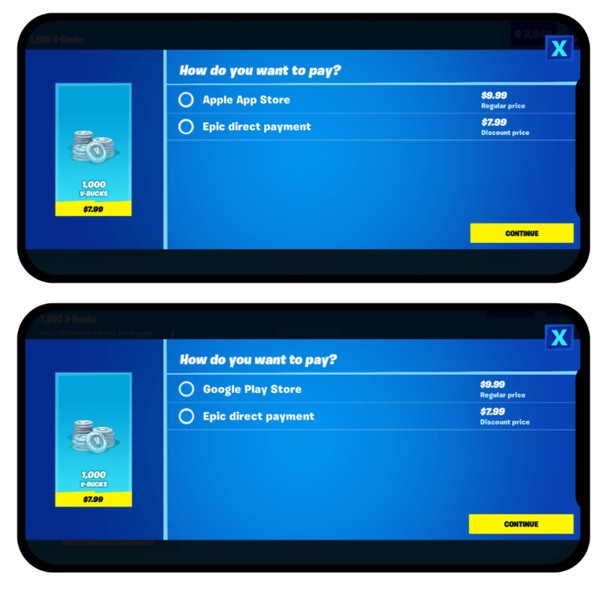Did Epic lie to the judge about its Fortnite hotfix?

What you need to know
- Epic Games' couldn't quite get its story straight in court yesterday.
- One developer says that Epic has lied to the judge in the case about how the payment system was activated.
- Miguel de Icaza pointed out the conflicting narratives.
Famed developer Miguel de Icaza noted on Twitter last night that Epic Games might have lied to the judge in the case of its lawsuit against Apple, and a hearing on a temporary restraining order.
Judge Gonzalez Rogers upheld Apple's decision to ban Fortnite, whilst blocking it from retaliating against Epic Games' Unreal Engine and developer tools.
But something doesn't quite add up about the way Epic explained the changes it made to its Fortnite payment system, and whether Apple should have spotted it. As noted by Miguel de Icaza:
The Lawyer for Epic just said that they didn't hide the new payment option and "apple knew where to look" and implied Apple did not look- I am thinking this is not true.
As Icaza notes, Apple's previous filings in the case maintain that Epic "activated a secretly planted payment mechanism in Fortnite to slide a non-approved change into the app that blatantly evaded App Review." Essentially, Epic is alleged to have made changes to the app "server-side", so there's no way Apple could have taken issue with the feature in a previous assessment of the app when it was submitted for review.
As noted at the hearing, however, Epic's lawyers fervently argued that they did not "hide" the feature from Apple and that the code was in the app "for several weeks". From Sarah Jeong's commentary on the hearing:
YGR: Epic Games didn't tell Apple that you had code in there that would allow you to collect directly from your consumers, right?Forrest: We'd never hide it. There are lines and lines of —YGR: I get to interrupt. That's my privilegeForrest: What happened here was that we ceased to comply with an anticompetitive provision. It was with code that was resident in the build for several weeks proceeding.
But as Miguel notes, Epic's own filing for the temporary restraining order says something else:
Epic lawyer lied in court today - Epic’s own TRO detailed that the additional payment option was triggered on the server, after the app had gone through app review: pic.twitter.com/l6NFpU5MH9Epic lawyer lied in court today - Epic’s own TRO detailed that the additional payment option was triggered on the server, after the app had gone through app review: pic.twitter.com/l6NFpU5MH9— Miguel de Icaza (@migueldeicaza) August 25, 2020August 25, 2020
In Epic's own words:
iMore offers spot-on advice and guidance from our team of experts, with decades of Apple device experience to lean on. Learn more with iMore!
"To make this payment choice available, the app did not download any executable code. Instead, the code performed the same server check that it had done previously but upon receiving notice of the two payment options, the code made both options accessible to users. (Grant Decl. 12-13.) The process of notifying an app to make existing functionality and updated content accessible to users through interaction with a developer's server is called a "hotfix", and the practice is common within the industry. (Id. ¶¶ 4-9, 11.) For example, new characters or items in a game can be made available to users upon notification from a developer's server. This process is also used for testing different versions of a feature to assess which is more successful. (Id. ¶ 9.) Indeed, the practice is so common in the industry that there are companies that specialize in helping developers deliver hotfixes. (Id. ¶ 11.) Epic has made hotfixes to Fortnite for years without Apple objection."
At the time I'd suggested that this was a server-side change to avoid App Store review. Sure enough, confirmed.
And not what Epic had said prior to yesterday. 😑 https://t.co/SkNe8Xmk6YAt the time I'd suggested that this was a server-side change to avoid App Store review. Sure enough, confirmed.
And not what Epic had said prior to yesterday. 😑 https://t.co/SkNe8Xmk6Y— Oliver Haslam (@OliverJHaslam) August 25, 2020August 25, 2020
As Miguel asserts, this seems like a pretty clear contradiction to what Epic told the judge in court yesterday, who explicitly said "it was with code that was resident in the build for several weeks", and if true, would undermine Epic's argument that Apple is somehow partly culpable for not picking up on the changes to code in its app when it was reviewed.
What do you think? Do Epic's explanations regarding its changes made to Fortnite stack up?

Stephen Warwick has written about Apple for five years at iMore and previously elsewhere. He covers all of iMore's latest breaking news regarding all of Apple's products and services, both hardware and software. Stephen has interviewed industry experts in a range of fields including finance, litigation, security, and more. He also specializes in curating and reviewing audio hardware and has experience beyond journalism in sound engineering, production, and design.
Before becoming a writer Stephen studied Ancient History at University and also worked at Apple for more than two years. Stephen is also a host on the iMore show, a weekly podcast recorded live that discusses the latest in breaking Apple news, as well as featuring fun trivia about all things Apple. Follow him on Twitter @stephenwarwick9
